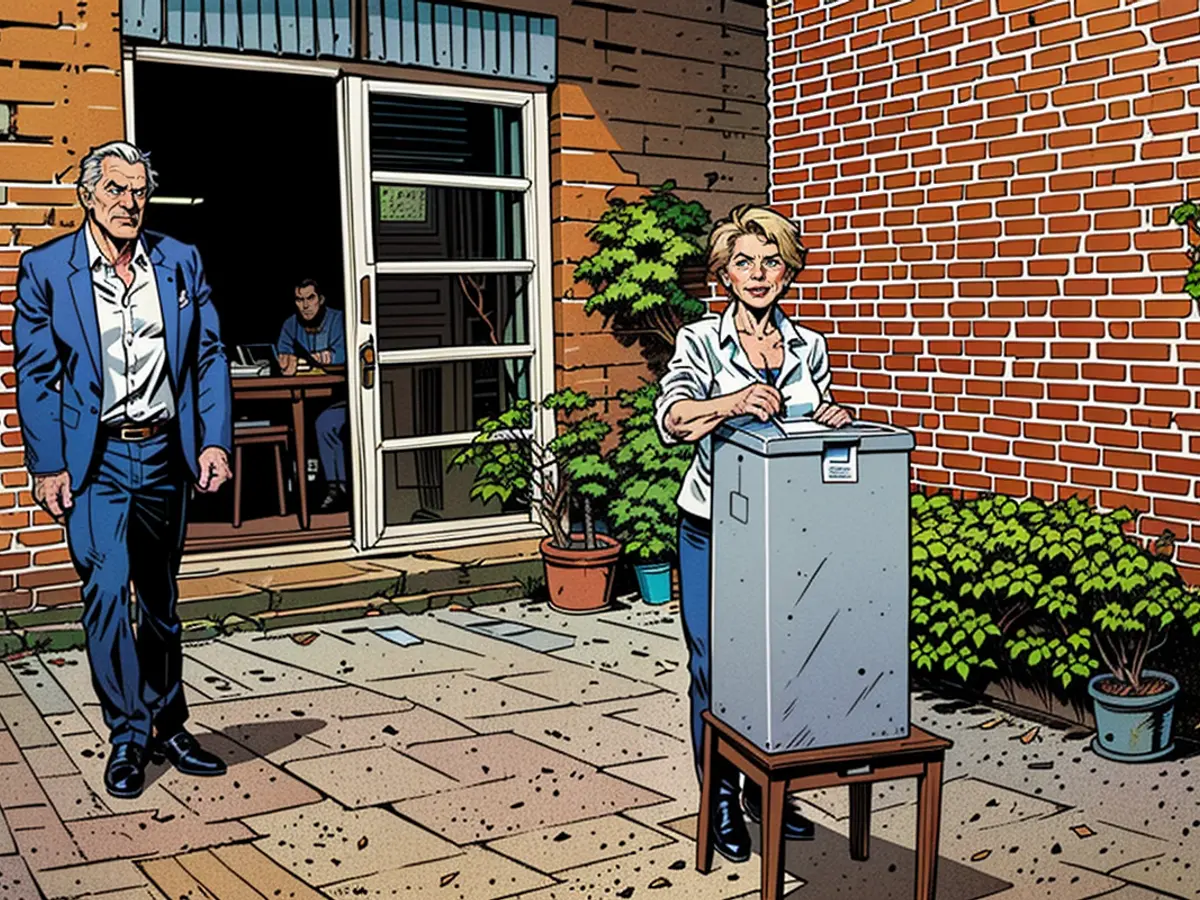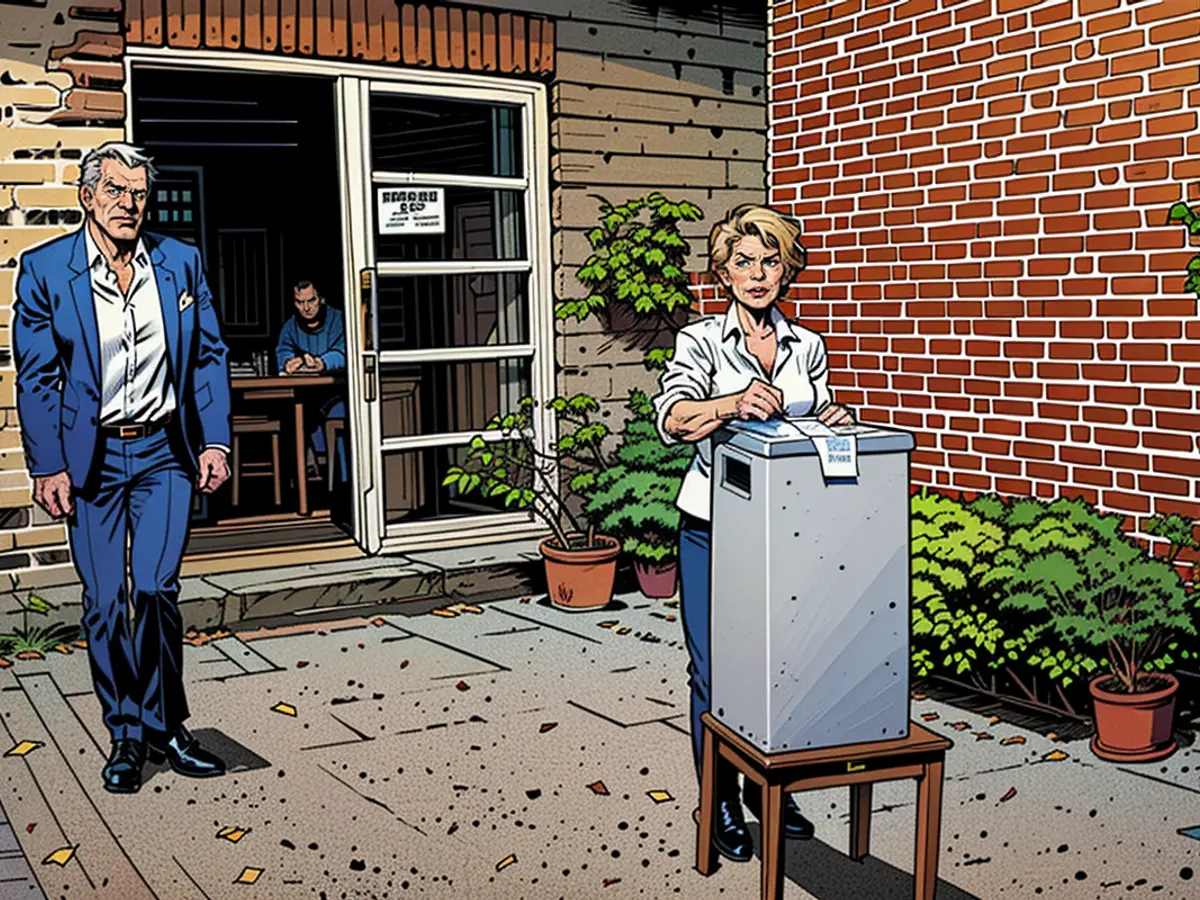12:18: Storms Damage Several Voting Locations in Austria
In Austria, certain polling stations for the EU elections have been unreachable or damaged due to a severe storm. Specifically in Styria, locations in Deutschfeistritz north of Graz and the Hartberg-Fürstenfeld district were affected, shared authorities. Swift action was taken by the local mayors who relocated the polling stations, with early signs posted in the towns and mayors also broadcasting the news on social media. No disruption to the voting process is expected, it is mentioned. Heavy rains and powerful winds hit Styria on Saturday, causing property harm and vehicle damages.
11:53 A political scientist expresses concern: "It's starting to get serious"
For the tenth consecutive time, a European Parliament is being directly elected but numerous eligible voters seem to overlook its importance. A political scientist, Thorsten Faas, could shed light on the difficulty of comprehending the EU and the role of the "protest element" in elections.
11:36 No statements from Ursula von der Leyen in Burgdorf-Beinhorn, Germany
German Chancellor Ursula von der Leyen - candidate for a second term as the President of the European Commission - casts her vote for the European election in her hometown. Alongside her husband Heiko, they visited a small polling place in Burgdorf-Beinhorn, Hanover region. Von der Leyen did not make a statement or answer any inquiries. After casting her ballot, she turned to the cameras, offered a quick smile and departed from the polling location after a short while.
11:04 Provided by polls: EPP could win the most seats in the EP
In Italy, polling stations won't close until 23:00. A preliminary overview of the European Parliament is anticipated from the EU starting at 20:15, based on post-election surveys and interim outcomes. Initial projections show a shift towards the right in the European Parliament. According to the latest surveys, the conservative European People's Party (EPP), including the CDU and CSU, might still dominate with 173 seats; the Social Democrats (S&D) could secure 143 MP seats; the Liberals are expected to acquire 75 seats; European Conservatives and Reformists (ECR) with the political party of Italian Prime Minister Giorgia Meloni could have 76 seats, and the smaller Identity and Democracy (ID) with French right-wing populist Marine Le Pen could grasp 67 seats.
10:35 A record for "Voting-O-Mat" usage: Nearly 11 million times
The Federal Center for Political Education experiences its largest number of uses of its "Voting-O-Mat" resource in the context of the European elections. This platform has been consulted by residents over ten million times, as announced on Wednesday. This exceeds the past usage peak seen four days before the vote in 2019, when the Voting-O-Mat was used 9.8 million times.
10:06 Celebrities urge the youth to vote with a campaign using AI
Several celebrities, employing artificial intelligence to make them appear youthful, have created brief videos encouraging their younger audience to vote. Veronica Ferres, for instance, wrote on Instagram that "European election is on June 9th - it's about the future of our continent! For the unprecedented first time, anyone 16 and above can vote! Utilize your voice and go vote on Sunday." Besides her, a comedian named Carolin Kebekus also emphasized the significance of voting, stating: "Hello, I'm the 16-year-old Carolin Kebekus. Do you remember what you wished for Europe when you were 16? Freedom, studying and working abroad, broadening your horizons. I couldn't vote back then. But you can now. So head out and vote for the Europe you dreamed of when you were 16 (or somewhat close)." Germany is allowing 16- and 17-year-olds to participate in the European Parliament election, approximately 1.4 million people.
09:35 The impact of the European elections is expected to strongly affect the Berlin "traffic light" coalition
Traditionally, the European elections see a low voter turnout. Political analyst Albrecht von Lucke believes this trend will be broken in this instance. Despite the upcoming right-wing shift and a warning for the Berlin "traffic light" coalition, this is likely to be tempered by a "however."
09:11 Potential win for a German-born man in Florence's municipal elections:
Eike Schmidt, a German-born candidate representing the post-fascist Italian party Fratelli d'Italia, could become Florence's mayor in the Italian municipal elections occurring today. Schmidt, previously director of the respected Uffizi museum, was supported by both the governmental party of Italian Prime Minister Giorgia Meloni and her coalition allies. The left party's candidate, Sara Funaro from the Democratic Party, currently leads in the polls for this position.
Concurrently with the European elections, municipal elections are happening in eight federal states of Germany. Residents in Baden-Württemberg, Brandenburg, Hamburg, Mecklenburg-Vorpommern, Rhineland-Palatinate, Saarland, Saxony, and Saxony-Anhalt are being invited to vote for district and municipal councils as well as mayors. In addition, the second round of Thuringian municipal elections, which took place on May 26, is also going on. Primarily, there's a spotlight on the local performance of the AfD (Alternative für Deutschland). Municipal elections in Brandenburg, Saxony, and Thuringia are being perceived as a significant litmus test for the state elections scheduled for September. The initial outcomes of the municipal elections are not anticipated to be disclosed till Monday. The European election, on the other hand, is being prioritized.
8:00 AM: Europe votes for a new parliament in Germany
Today marks the commencement of European elections within Germany. This is the only direct election that crosses borders in the EU: Europe is electing a new parliament, and Germany's polling stations have been functioning since 8 am. Till 6 pm, citizens aged 16 and above - for the first time ever - can cast their votes on the makeup of the European Parliament. An estimated 1400 candidates are competing for seats in Germany, representing 35 different parties and other political groupings.
Voting also occurred in 20 other EU nations today. There have already been elections in countries such as the Netherlands, Ireland, and Slovakia. A total of 360 million individuals across the EU are eligible to vote, with 720 seats open for competition, 96 of which are in Germany.

Read also:
Despite the challenges faced in some regions, such as Austria where certain polling stations for the EU elections were affected by severe storms, causing disruptions in locations like Deutschfeistritz and Hartberg-Fürstenfeld, German Chancellor Ursula von der Leyen, a candidate for a second term as the President of the European Commission, participated in the European elections in her hometown of Burgdorf-Beinhorn, Germany. Sharing common ground with Austria, Germany also allows 16- and 17-year-olds to participate in the European Parliament election, marking a shift in the voting dynamics across Europe.








